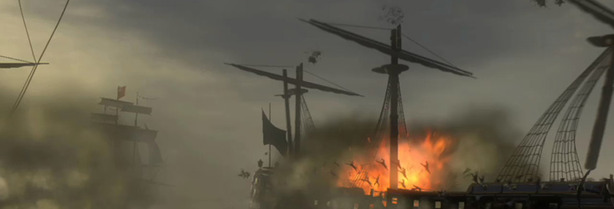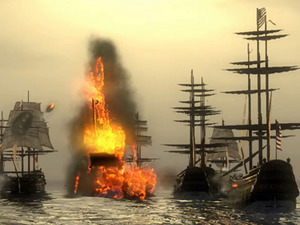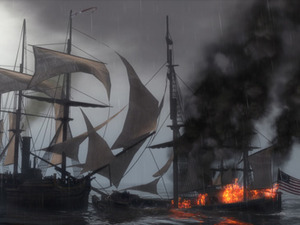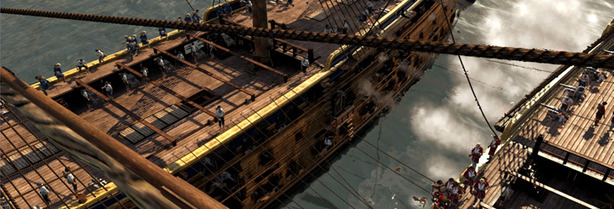More Naval Warfare
Not only is the wind of Empire: Total War modelled as a proper physical force, but so is everything else. Each cannonball or chainshot is a physical object, each mast and sail too, and even the water is more than just a flat surface with a pretty texture – fight during a storm and you’ll have rain and swell to deal with as well as hundreds of giant metal balls flying toward you.Similarly, when firing a volley of chainshot at a ships sails, the damage isn’t be calculated by some arbitrary probability law. Instead, the game knows the trajectory and force of each chainshot and will apply a level of damage proportional to its velocity if and only if that particular piece of chainshot hits a sail or mast.
If you fire roundshot into a weak hull at point-blank range, there’s a good chance that the balls will travel all the way through the hull and emerge the other side to potentially damage another ship.
CA says that it’s not currently using Nvidia’s PhysX physics API in Empire but that the development team is playing with it. This is in contrast to Nvidia’s claims that CA is using PhysX for Empire. The sails certainly reminded us of the better PhysX cloth demos, but CA is adamant that the physics engine of Empire has been developed in-house.
Fire poses a significant problem with the ships of the 18th Century, as they’re mostly made of wood and have highly flammable canvas sails. Some units, such as the long-range rocket ship, will cause fires which need to be extinguished as soon as possible – if a ship catches fire, crew is diverted away from the guns to put it out, slowing your rate of fire. If the crew of a ship is already engaged in an action – maybe you’ve charged both your broadsides, for example – they can’t be diverted and so the fire will ravage through the ship.
Fire will spread from one ship to another too, if the wind is sufficiently strong to blow it. This can easily be used to your advantage – have rocket ships target the windward side of a fleet and you might get lucky and set the whole lot on fire. Similarly, set the vanguard of a fleet alight and you’ll set a large obstacle for the rest of an opposing fleet to avoid.
We’ve even heard of one situation where a player was less than pleased at having a ship of his boarded, so set light to the boarding ship, thus burning both his and his opponent’s ship.
This is less petulant than it might at first seem, as a successful boarding action means that you steal the knowledge of how to build the ship you’ve boarded. Boarding is still a case of auto-resolving based on morale and crew numbers though, and should be considered carefully as it takes one of your ships out of the fight.
Then again, if it leads to scenes like the one above, we’ll be buckling swashes with the best of them. Morale boosters, such as sauerkraut to keep scurvy under control, can be researched as well as more obvious upgrades such metal-plated hulls.

MSI MPG Velox 100R Chassis Review
October 14 2021 | 15:04














Want to comment? Please log in.